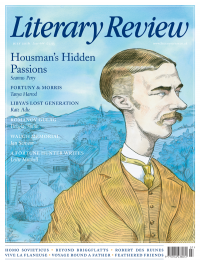David Wheatley
Guided by Voices
The Poems of Basil Bunting
By Don Share (ed)
Faber & Faber 571pp £30
Basil Bunting’s re-emergence in 1966 with his long poem Briggflatts coincided with a period of extraordinary revival in British poetry. Rosemary Tonks was in her all-too-brief heyday before her disappearance in the 1970s; J H Prynne published The White Stones in 1969; W S Graham emerged from a long silence with Malcolm Mooney’s Land in 1970; and David Jones, Bunting’s fellow survivor from the heroic age of modernism, published a late masterpiece of his own, The Sleeping Lord, in 1974. As with much of the rest of his life, the story of Bunting’s creative reawakening has been heavily mythologised. Expelled from Mossadegh’s Iran and subbing on the Newcastle Evening Chronicle, he was befriended by Tom Pickard and decided to write a long poem to show Pickard how it was done. The notebook version, Bunting boasted, was fifteen thousand lines long before being reduced to a tidier seven hundred lines. Evidence for the missing lines is scant, but the work masterfully harvested by Don Share here is reminder enough of Bunting’s centrality to modern British poetry.
His was a sensational life, as recounted (not always reliably) in Richard Burton’s 2013 biography A Strong Song Tows Us: The Life of Basil Bunting. Bunting was raised a Quaker, a fact that influenced his decision to become a conscientious objector during the First World War. Arrested in Paris in

Sign Up to our newsletter
Receive free articles, highlights from the archive, news, details of prizes, and much more.@Lit_Review
Follow Literary Review on Twitter
Twitter Feed
It wasn’t until 1825 that Pepys’s diary became available for the first time. How it was eventually decrypted and published is a story of subterfuge and duplicity.
Kate Loveman tells the tale.
Kate Loveman - Publishing Pepys
Kate Loveman: Publishing Pepys
literaryreview.co.uk
Arthur Christopher Benson was a pillar of the Edwardian establishment. He was supremely well connected. As his newly published diaries reveal, he was also riotously indiscreet.
Piers Brendon compares Benson’s journals to others from the 20th century.
Piers Brendon - Land of Dopes & Tories
Piers Brendon: Land of Dopes & Tories - The Benson Diaries: Selections from the Diary of Arthur Christopher Benson by Eamon Duffy & Ronald Hyam (edd)
literaryreview.co.uk
Of the siblings Gwen and Augustus John, it is Augustus who has commanded most attention from collectors and connoisseurs.
Was he really the finer artist, asks Tanya Harrod, or is it time Gwen emerged from her brother’s shadow?
Tanya Harrod - Cut from the Same Canvas
Tanya Harrod: Cut from the Same Canvas - Artists, Siblings, Visionaries: The Lives and Loves of Gwen and Augustus John by Judith Mackrell
literaryreview.co.uk